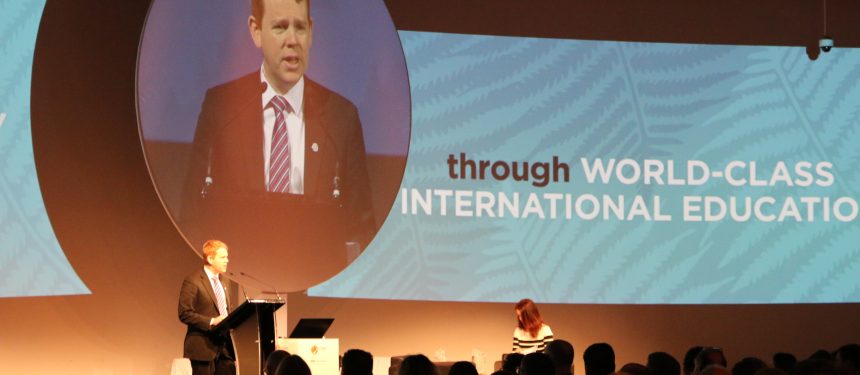A new three-pillared national strategy to ensure the long-term sustainability and reputation of New Zealand’s international education industry and increase domestic students’ access to international experiences has been launched at NZIEC.
News and business analysis for Professionals in International Education
Have some pie!
NZ: New strategy moves focus from numbers to global citizenship
 NZ's new strategy will try to increase international experiences for domestic students. Photo: The PIE
NZ's new strategy will try to increase international experiences for domestic students. Photo: The PIE The International Education Strategy 2018-2030, which replaces the 2011 Leadership Statement for International Education, outlines three goals: delivering excellent education and student experiences, achieving sustainable growth, and developing global citizens.
“If you focus just on numbers and economic values it tends to cloud everything else”
“I see the strategy… providing a clear path that will enable the full potential of the international education sector to be realised,” education minister Chris Hipkins said at the launch.
“Together we’ve got what it takes to have the best international education offering in the world. So let’s show everybody how that’s done.”
Of the three goals, the strategy outlines ten indicators of success, including a student satisfaction rating of 95 – 97% by 2030, a redistribution of value to regions, and a doubling in the uptake of education pathways.
While economic impact is included, with an aim of NZ$6b by 2025 (a NZ$1b upgrade from the former Leadership Statement), the strategy does not include indicators relating to student numbers, which Hipkins said was vital to achieving quality and sustainability goals.
“The rapid growth that international education has experienced in recent years has resulted in some negative impacts on international students,” he said.
“International education must be a sustainable sector that plays to New Zealand’s strengths. It’s a quality proposition, not a numbers game,” he added, reflecting immigration minister Iain Lees-Galloway’s comments of quality over quantity at the announcement of new post-study work rights.
Education New Zealand chief executive Grant McPherson said the new strategy broadened the industry’s understanding of international education and put an emphasis on the value of student experience and global citizenship.
“The buy-in from local school communities has got to be around internationalisation”
The strategies include a long-term advocacy strategy and the formation of sector-wide associations to advocate international interests, which McPherson said was a marked difference from focusing on economic value alone.
“That allows us to think about things in a bit of a different way, around how we determine what is that value to the student, what is that value to the education provider, and what is the value to the country,” he told The PIE News.
“Sometimes if you focus just on numbers and economic values, it tends to cloud everything else. While the wider value and wide contribution of international education has always been there, it’s really about celebrating that more.”
Julia Innocente-Jones, assistant vice-chancellor international at the Victoria University of Wellington, called the strategy a “step in the right direction”.
“We’re looking forward to implementing it, both from a university perspective [and] from a New Zealand perspective,” she said.
“We want to be able to add value at every step of the way in terms of the student journey.”
The strategy’s focus on developing global citizens will also see the implementation of strategies to tap into New Zealand’s international graduates, promote international education as an academic field, and develop outbound mobility and global competencies for domestic students.
John van der Zwan, executive director of Schools International Education Business Association, said this would have a major benefit for the school sector.
“The social licence and the buy-in from local school communities has got to be around internationalisation and the value to local students and outbound is a big part of that,” he told The PIE, adding many families didn’t consider study abroad because of cost.
“Including those things within the strategy really gives us a good opportunity to start having those conversations at a much higher level and a much more meaningful level with the government.”
New Zealand’s international education industry is currently “rebalancing“, after student numbers declined overall in 2017, but economic impact remained steady, due to larger numbers of post-graduate students.
Still looking? Find by category:


